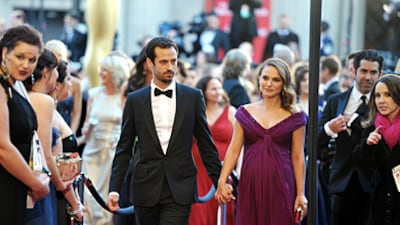For someone who should be riding high off her recent Oscar glory, Natalie Portman has lately been the object of some unexpected resentment. Curiously, it’s not her Best Actress win that’s stoking controversy around the political and cultural spheres, but rather her pregnancy.
Just last week, Mike Huckabee pointed to Portman as an example of how " society often glorifies and glamorizes" out-of-wedlock pregnancies. He didn’t mention the other part of the equation: Benjamin Millepied, the choreographer of Black Swan, who emerged from obscurity and onto red carpet territory after impregnating and proposing to the Hollywood darling. During her acceptance speech at this year’s Golden Globes, the normally poised and notoriously private Portman offered an awkward introduction for her beau:
“You might remember him in the movie as the guy, when they ask, Would you sleep with that girl, he’s like, ‘psh,’ no. He’s the best actor. It’s not true, he totally wants to sleep with me,” Portman cracked. And then she let out a somewhat graceless—some might say nervous—laugh, later magnified by the powers of the Internet in a video that looped those two seconds over and over.

Last weekend, Portman was on top again. She accepted her Best Actress Oscar with a speech full of gratitude for the people who had helped her to this particular moment, including, again, Millepied, whom she thanked for bestowing her with “my most important role of my life”— motherhood. Portman's comment sparked a mini-uproar on women’s sites, which bristled at her for downplaying her professional accomplishments and essentially thanking Millepied for his sperm. “Like, my garbage man could give you your greatest role in life too, lady," Lizzie Skurnick, a writer at Politics Daily, tweeted.
It makes sense that Portman’s now spotlighted romance and pregnancy has inspired a healthy mixture of resentment, contempt, and, let’s admit it, jealousy. For many, she is the embodiment of what infuriates every fallible human: perfection. These latest headlines are a crowning act to an already charmed life.
Portman has managed to sail adeptly through her still relatively young career, racking up critical acclaim and all the while avoiding the usual pratfalls of child stars. She even spoofed her own saintly reputation in a curse-filled rap on Saturday Night Live. Her ethereal beauty has been described as “so extreme that its sole purpose is the feeding of obsession,” and she has been dubbed the “perfect woman” by a Facebook page devoted to the actress. A Harvard graduate, Portman once served as an ambassador for Fina, a microfinance organization, and of her non-celebrity pursuits Portman has said, “I’d rather be smart than a movie star.”
However, Portman needn’t choose; she can be both apparently, which is precisely what some find so maddening. The New York Times recently revealed that being an award-winning scientist was among one of Portman’s “lesser-known but depressingly impressive” accolades. That same article pointed to Portman’s precociousness, a description one can't avoid tripping over when reading about her—inspired presumably from her gifted turn as a child assassin in Luc Besson’s The Professional at age 11.
But at 29, and as a mother-to-be, Portman’s precociousness may be catching up with her. Her perfection can sometimes verge on pedantic, like with her conversion to veganism. “Veganism certainly lays yourself at a precious corner of culture,” says The Daily Beast’s Richard Rushfield. “Precious and privileged.” Then there’s the sense that Portman in real life is all too similar to her white swan character, a ballerina obsessed with perfection (she’s been mockingly called “ little miss perfect”) and straining to play the black swan. In her latest movie, the raunchy romantic comedy No Strings Attached, Portman "just feels contrived," says Rushfield, like she's "playing relaxed or human."
Being branded as precociousness can also suggest that certain accomplishments of hers have been premature—or undeserved. “I’ve never believed her in a single role,” wrote Dana Stevens, Slate’s movie critic, in 2009, which led to the speculation that “the most powerful accessory in Portman's bag of tricks is still her beauty”.
Though Portman’s beauty may be preternatural, she’s not beyond reproach. During a 2004 interview, the actress said about her celebrity status and in reference to reading W.E.B. DuBois’ The Souls of Black Folks, “I’m not black, but I know what it feels like.” She later issued an apology “for being insulting or ignorant.” And when she decided to get holier-than-thou about her new-found veganism in 2009 after reading Jonathan Safran Foer’s Eating Animals, people were quick to point out her distortion of eating meat and rape. Which, in turn, only served to remind of the time she supported a rapist by signing a petition for Roman Polanski, the Polish-French filmmaker who pleaded guilty to unlawful sex with a 13-year-old girl and then fled the country. To some, Portman’s high-minded flubs can verge on Gwyneth Paltrow levels of tone deafness.
The microscopic attention paid to her stumbles likely has much to do with that impossible yardstick of perfection. There's also the fact that throughout her career Portman has been plagued by a perception of being beyond her years. The New York Times once pointed out to her in an interview, “You have had a kind of precocious child-woman quality in some of your films that has elicited a Lolita-esque response.” Portman herself has acknowledged that her younger roles received undue attention from a “culture [that] fetishizes little girls.” Her role in Garden State led to Portman’s assignation as the fey, Manic Pixie Dream Girl, a term coined by Nathan Rabin to mean an archetype that “exists solely in the fevered imaginations of sensitive writer-directors to teach broodingly soulful young men to embrace life and its infinite mysteries and adventures.” Being cast as such also means that Portman, as the Manic Pixie Dream Girl, “must never grow up, because that way, men never have to grow up, either.”
The nymph-muse is a part that Portman was in some ways born for. “She still looks very young and acts young,” Rushfield says. Perhaps that ingrained impression of innocence is why so little attention, by tabloid standards, was paid to the fact that Millepied may have left his live-in girlfriend for Portman. As Helen Andelin wrote in 1963 in her decidedly anti-feminist book Fascinating Womanhood, "men never want women to grow up completely... Truly fascinating women always remain somewhat little girls, regardless of age.”
But now with swollen belly, and a public acknowledgment of her sex life, we’re confronted with the possibility that Portman might actually graduate from those roles. The problem is that she still seems haunted by her Lolita years. For critics who have for 19 years watched her play the perennial ingénue, Portman may have just stumbled onto her most implausible role yet: motherhood.
Joyce Tang is outreach editor for The Daily Beast. Her work has appeared in Mother Jones and The Miami Herald.






